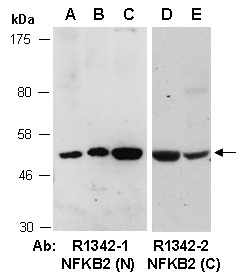Abiocode Logo
Products
Contact Us
- Telephone:
1-818-707-0309 - E-Mail:
Abiocode@Abiocode.com
R1342-vp - NFKB2 (vPairTM) Antibodies
|
Predicted I Observed M.W.: 97, 52 I 52 kDa Uniprot ID: Q00653
Application: WB
Quantity: 50 ul NFKB2 (N) (R1342-1) Rabbit Polyclonal Antibody &
50 ul NFKB2 (C) (R1342-2) Rabbit Polyclonal Antibody
Product Introduction:
vPairTM antibodies represent a pair of fully characterized antibodies that recognize two different regions of a target protein. The product is developed by Abiocode to address whether the signal observed truly represents the protein of interest, an often encountered issue in antibody-based assays. The use of a pair of fully characterized vPairTM antibodies in the same assay can validate signal specificity since vPairTM antibodies recognize two independent epitopes of the same protein. Different sets of vPairTM antibodies are developed at Abiocode to work with specific applications, including antibody arrays, Western blot, IP-Western, ChIP, IHC, and FACS. Background: NF-kappa-B is a pleiotropic transcription factor present in almost all cell types and is the endpoint of a series of signal transduction events initiated by a vast array of stimuli related to many biological processes, such as inflammation, immunity, differentiation, cell growth, tumorigenesis and apoptosis. NF-kappa-B is a homo- or heterodimeric complex formed by the Rel-like domain-containing proteins RELA/p65, RELB, NFKB1/p105, NFKB1/p50, REL and NFKB2/p52. The dimers bind at kappa-B sites in their target genes with distinct affinity and specificity. Different dimer combinations act as transcriptional activators or repressors, respectively. NF-kappa-B complexes are held in the cytoplasm in an inactive state by members of the NF-kappa-B inhibitor (I-kappa-B) family. In a conventional activation pathway, I-kappa-B is phosphorylated by I-kappa-B kinases (IKKs) in response to different activators, subsequently degraded thus liberating the active NF-kappa-B complex which translocates to the nucleus. In a non-canonical activation pathway, the MAP3K14-activated CHUK/IKKA homodimer phosphorylates NFKB2/p100 associated with RelB, inducing its proteolytic processing to NFKB2/p52 and the formation of NF-kappa-B RelB-p52 complexes. The NF-kappa-B heterodimeric RelB-p52 complex is a transcriptional activator. The NF-kappa-B p52-p52 homodimer is a transcriptional repressor. NFKB2 appears to have dual functions such as cytoplasmic retention of attached NF-kappa-B proteins by p100 and generation of p52 by a cotranslational processing. The proteasome-mediated process ensures the production of both p52 and p100 and preserves their independent function. Other Names: Nuclear factor NF-kappa-B p100 subunit, DNA-binding factor KBF2, H2TF1, Lymphocyte translocation chromosome 10 protein, Nuclear factor of kappa light polypeptide gene enhancer in B-cells 2, Oncogene Lyt-10, LYT10, Lyt10 Source and Purity: Rabbit polyclonal antibodies were produced by immunizing animals with GST-fusion proteins containing either the N-terminal [NFKB2 (N) (R1342-1)] or the C-terminal [NFKB2 (C) (R1342-2)] region of human NFKB2. Antibodies were purified by affinity purification using immunogen. Storage Buffer and Condition: Supplied in 1 x PBS (pH 7.4), 100 ug/ml BSA, 40% Glycerol, 0.01% NaN3. Store at -20 °C. Stable for 6 months from date of receipt. Species Specificity: Human, Mouse Tested Applications: WB: 1:1,000-1:3,000 (detect endogenous protein*) *: The apparent protein size on WB may be different from the calculated M.W. due to modifications. Product Data:
|
